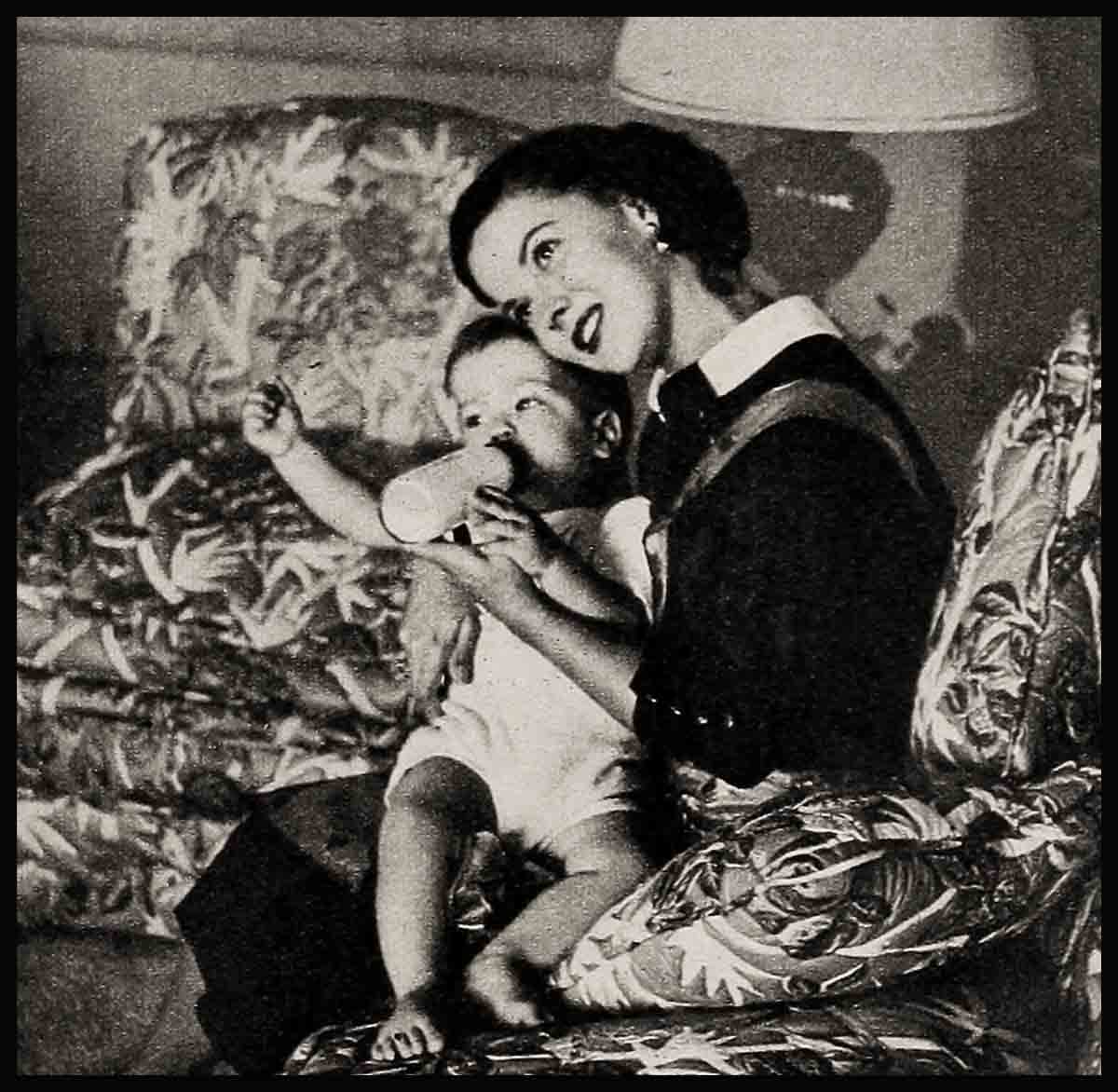
Why Shirley Temple Came Back
We had scarcely sat down for a chat when a doorbell rang; and one of the most famous young ladies in the world, a pert, svelte brunette, got up to answer. Naturally Hopper had to peep out to see who the caller could be. It was a middle-aged man bearing a yellow envelope.
“I have a telegram for Shirley Temple,” he said. “Well,” said the girl, “I used to be Shirley Temple.” The messenger almost dropped his teeth. Scratching his head in wonderment, he stared at the girl and finally said, “If you’re Shirley Temple, I must be getting older than I thought.” He seemed a bit dubious about handing her the telegram. I still don’t believe he thought the girl was Shirley Temple.
But indeed it was. After two years in the east, where her husband, Charles Black, had served a re-call term with Naval Intelligence in Washington, Shirley had come home—but not as Shirley Temple. She insists on being called Shirley Black. Her hair was a natural dark brunette in color. Though her looks are still bright with youth, they contain a suggestion of the matronly. Those famous childhood dimples are not so pronounced. “I’m a quarter of a century old,” she said, seeming to take a particular satisfaction in that “century” bit.
Most outstanding in Shirley’s personality is a gentle, mocking sense of humor, which is applied liberally toward herself. In conversation you have to watch that girl, or she’ll have your neck in a twist from double-takes trying to find out whether she’s serious or kidding. Almost always there is a faint trace of humor in her eyes.
“Well,” said I, “you’re stuck with being Shirley Temple whether or not you ever do another day of acting. You became an American institution. You grew into the hearts of movie-going people and they’ll never let you go. When do you start back to work?”
She reflected for a moment before answering. “Hedda,” she said finally, “you must understand this. When I was a teen-ager I was very definite about everything. Now I am not so sure. But I cannot see myself ever returning to show business. Making pictures was a happy experience for me; and I have never regretted spending my childhood on sound stages, as some grownup ex-child actors would have you believe they did. But I started at three and feel that I’ve had enough.”
“Is this the real cause for your retirement?” I asked.
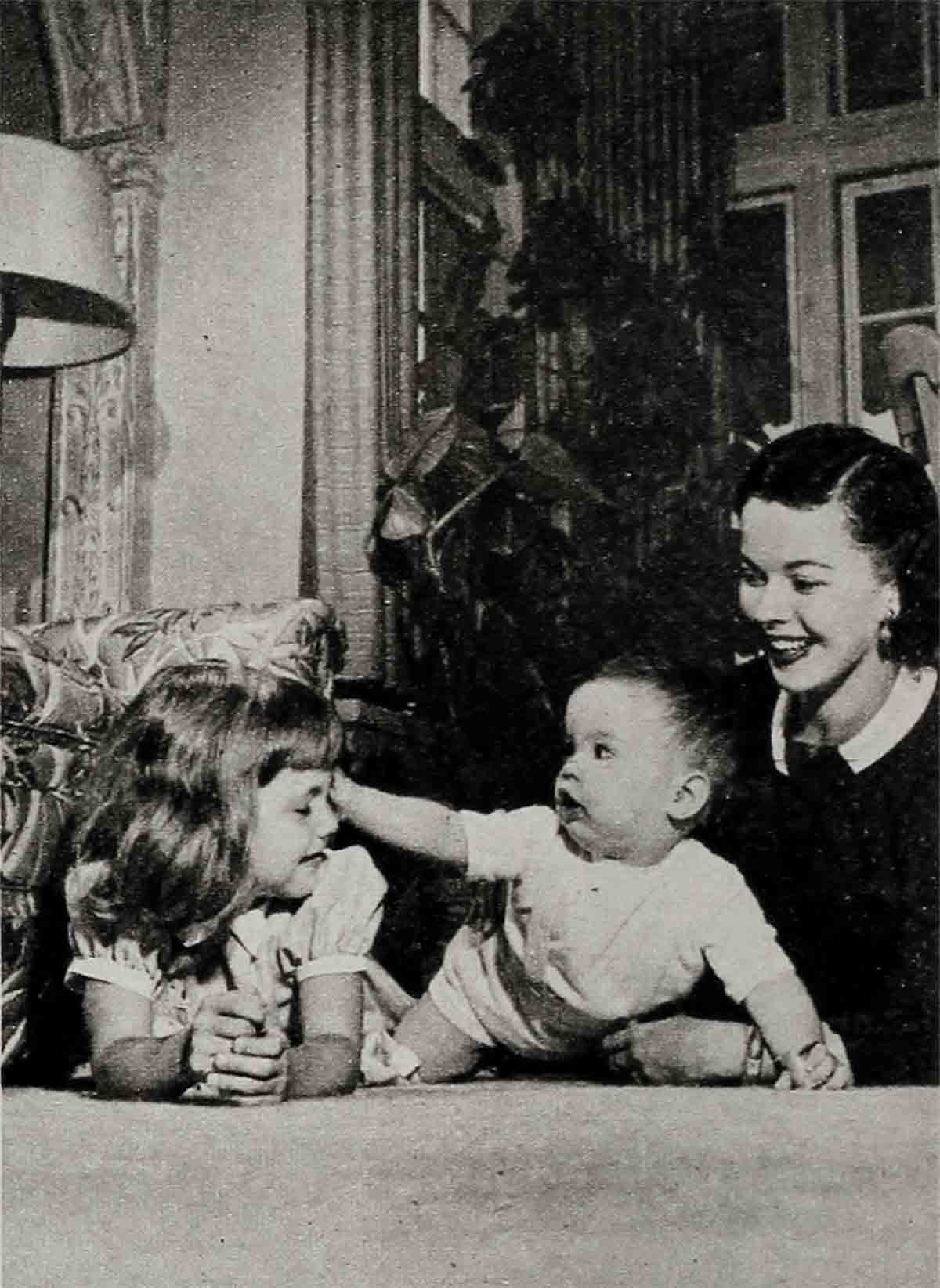
“It’s not the whole picture,” said Shirley. “In 1950, David Selznick made me a very exciting offer. He wanted me to go to Europe and do films under his guidance. That would have given me a wonderful opportunity to develop as an actress, by working with great foreign directors. It also provided a situation in which I could do a lot of traveling, an idea that appealed to me.
“I had to make a decision; and I couldn’t do it in this town. I had to get away and think. So I flew to Honolulu. On the plane over, I began to think of Susan. She needed my care. And I could never go to Europe and leave her behind. Also I didn’t want to endanger another marriage by having a career. This was before I met Charles Black. Anyhow, before I reached Honolulu, I’d made my decision. I was going to retire.”
“You mean you wouldn’t make a picture or do a television show if good scripts were given you?” I asked.
“Hedda, as I said before, I’m a quarter of a century old and am not too sure about anything except my marriage. But I’ll tell you this: The script would have to be—let’s say irresistible—before I’d come out of retirement. Charles and I were amazed by a report that he and I were going to do a television series together. We had no such intentions. I may try a comeback like some people such as—let’s see—no, Gloria Swanson isn’t old enough.”
“Where is Charles, by the way?” I said.
“Downtown,” was her vague reply. Then she turned upon me a puckish smile that seemed to say, “He got away in time to escape this grilling.”
“I understand he’s going back to television,” said I.
“I can’t say what he’s going to do,” said Shirley. “It’s so wonderful to be able to say that instead of answering questions about myself.”
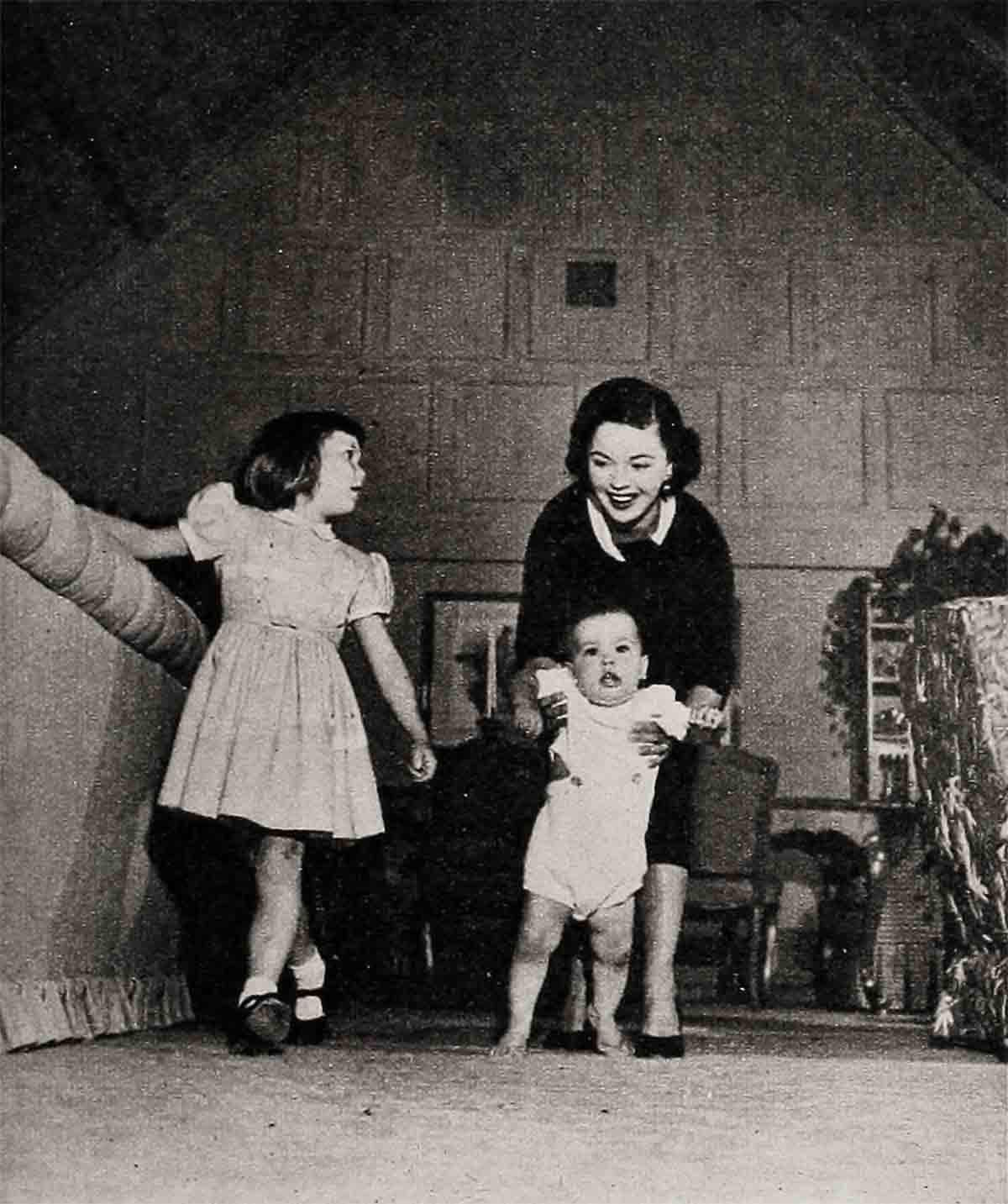
At this juncture, in bounced daughter Susan. “Do you want to say hello to Hedda?” asked Shirley.
“Hello,” said Susan.
“Now, do you wish to shake hands or avoid it?” asked Shirley with a sparkling mirth in her eyes.
Susan thought the matter over and stuck out her hand to me. There certainly wasn’t anything phony or repressed about that child. Shirley was teaching her to make her own decisions.
“Susan has on her President Eisenhower dress,” explained Shirley. “She wore it tu the White House when we visited the President just before returning here.”
“Was she awed by Ike?” I asked.
“Awed!” exclaimed Shirley. “The first thing she said was: ‘Good morning, Mr. President, man of the hour.’ That positively wasn’t rehearsed. Mr. Eisenhower tried to explain to Susan that during campaigns terms were loosely applied to candidates Then Susan asked the President what he had for breakfast. Mr. Eisenhower said he had a businessman’s breakfast. ‘Oh, that’s too bad,’ said Susan. After that Charlie and I took a back seat. Susan sat down, rested her chin in her hand, and gazed at the President like a teen-ager. She monopolized the whole conversation.”
“I can play monkey music,” said Susan. “Do you want’ to see me do it?”
I replied that the idea intrigued me no end.
Susan sat down at a small piano. “You do just like this on the keys,” she explained, illustrating with one hand. “Then I can do lion and monkey music together with both hands. And there’s tiger music.”
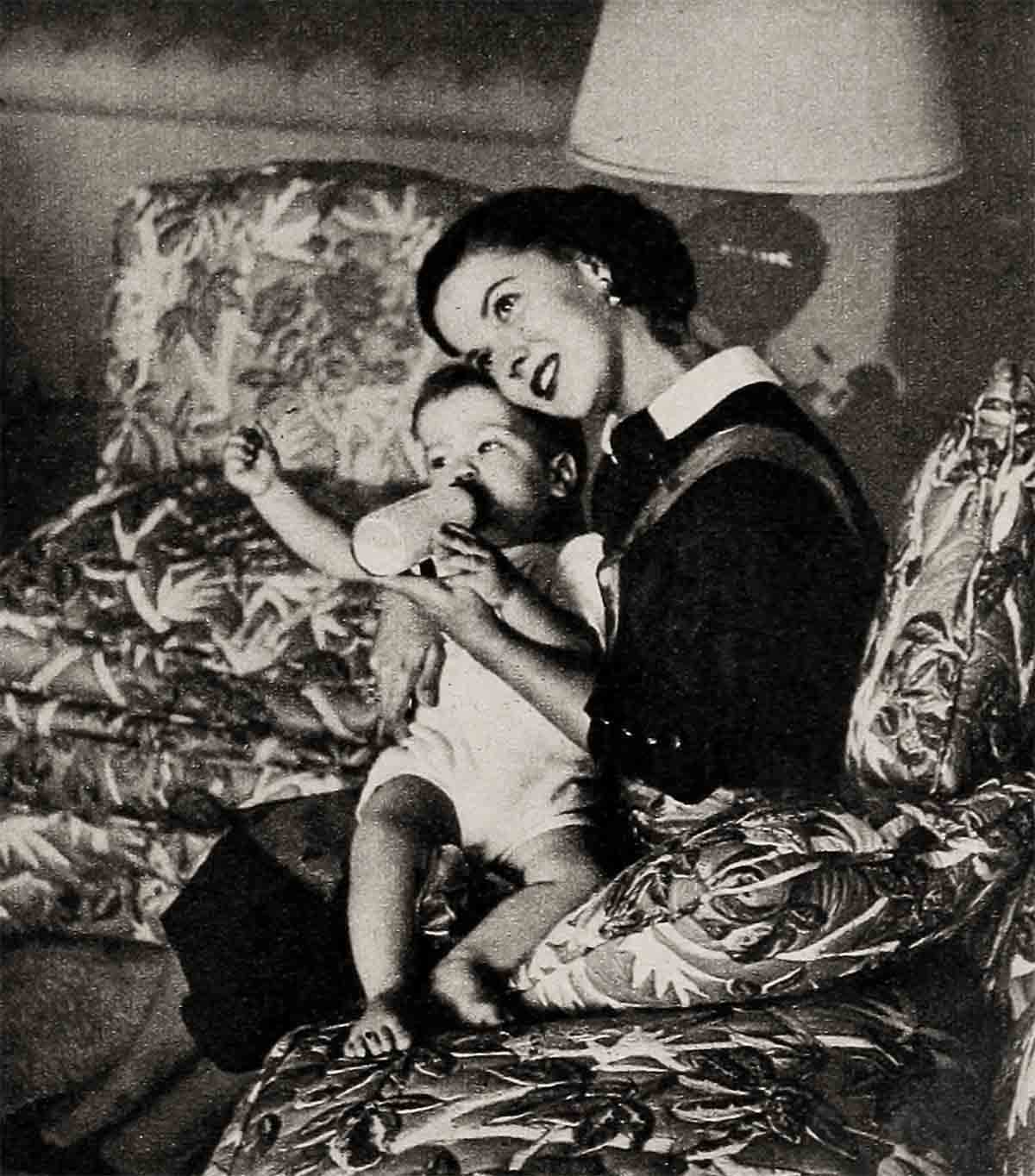
“Susan,” said Shirley, “Hedda and I are going to talk. You can go outside, or you can sit here and be very, very quiet. Do you think that’s possible?”
The little girl, after reflecting on the problem, decided that silence would be too great a strain. She skipped out to a balcony where red geraniums shone brightly in the morning sunshine.
“We call her Sarah Heartburn,” laughed Shirley. “Any minute now she’ll make an entrance with hand on hip.”
“At her age, you were a star,” I said. “Would you have any objection to her going into show business?”
“She’ll have to be old enough to make her own decision about that,” answered Shirley. “I wasn’t, but at heart I suppose I was a little exhibitionist. I loved working in films, as I told you. But I cannot tell whether Susan would or not. plenty of time to find out.”
The telephone rang. “More real estate people,” sighed Shirley, as she went to answer it. At that time she was frantically searching for a home for her family. She, Charles, the two children, a brother, and her parents were all temporarily living in the famous “Doll House,” where Shirley had dwelled during her first marriage. It is a small but beautiful place that got its name from a collection of 1500 dolls Shirley kept in a downstairs room. And it was never a playhouse for the child star, as has often been erroneously reported. For a couple it is ideal in size.
“Why did you ever sell this place?” I asked Shirley when she returned from the phone.
“I wanted to sell it,” she said, “because I was a Navy wife. Charlie and I didn’t know where we would land while he was in service. So I put the place up for sale, before we started driving East. We had got no farther than Palm Springs, before my parents called to say they’d like to buy the house themselves. So they did.”
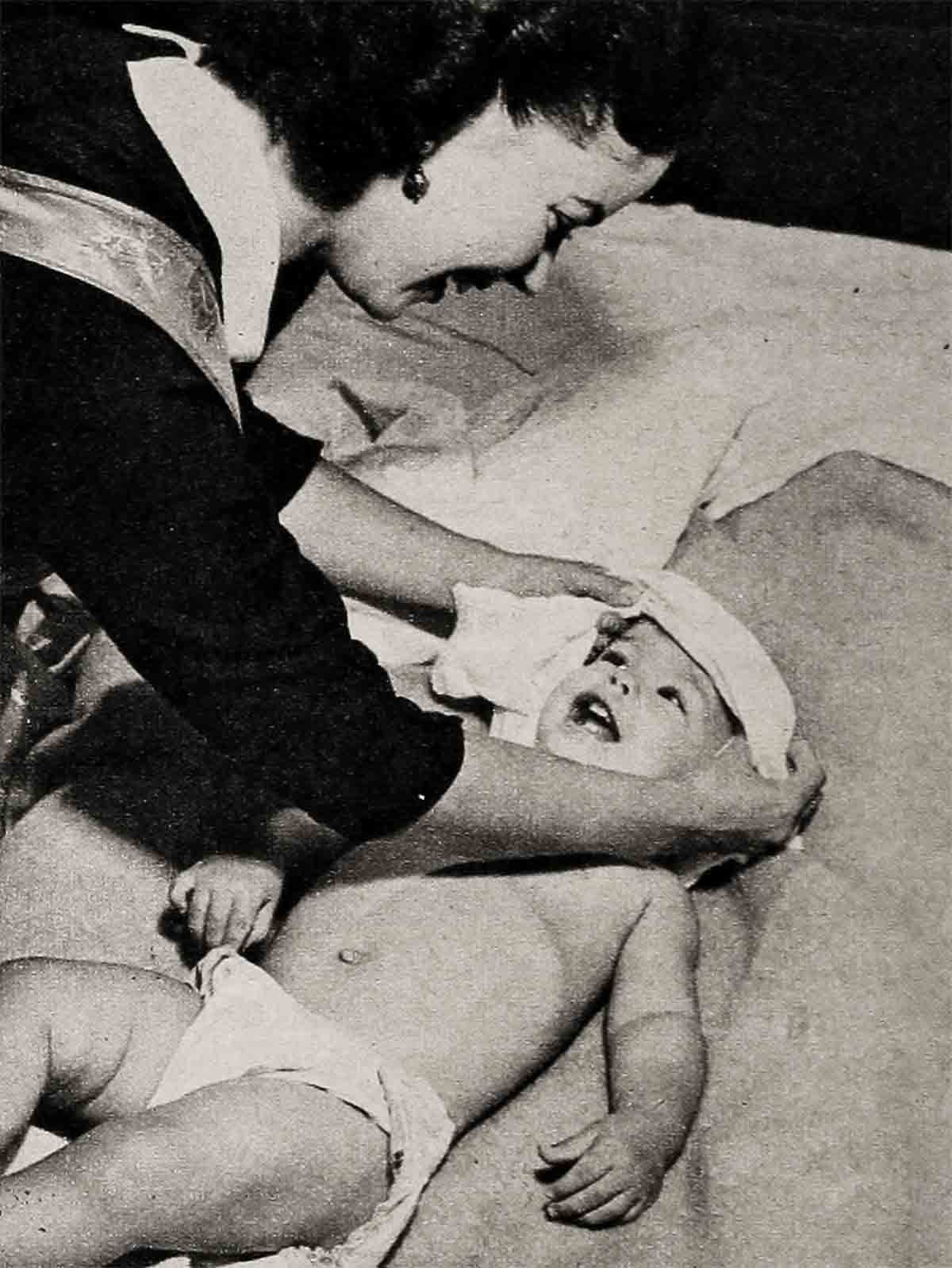
Shirley, incidentally, found a home in Beverly Hills a few days later, and rented it for a year. “I suppose I should be sentimental over Hollywood,” said she, “but I’ve discovered that if you’re happily married, where you live doesn’t matter. Charlie and I always love best the place in which we’ve lived last. Our home, as you know, was very simple in Maryland, but we grew very sentimental about it.”
Susan had come back into the room just as a small cry came from a bedroom. “Mommy—the baby,” said she. Both mother and daughter dashed into the temporary nursery.
From it, soon I could hear Shirley and Susan singing “The Big Bad Wolf” for the awakening baby’s amusement.
“He’s got a bald head down here,” said Susan.
“That must be because he is getting older,” said Shirley.
I translated this cryptic language into the fact that on the previous day Charles Jr. had got his first haircut for the MODERN SCREEN photographers we were expecting.
Susan pranced back into the room, announcing, “We’ve got a little boy here.” The baby, whom Susan insists on calling Barton is a husky infant, weighs twenty-six pounds, and looks much like his father. Shirley handled him with great care and competence.
“You know,” said Susan, pointing to a spot on the back of her neck, “Barton used to have hair right down to here.”
“But the barber cut it off. He’s growing into a big boy like daddy,” Shirley explained. Then like any mother she gazed upon the shorn locks and said to me, “He looks so different. His hair used to be cute and curly.”
“I know,” said I. “That haircut is the first step to manhood. It makes a mother feel that her boy is already starting to leave her.”
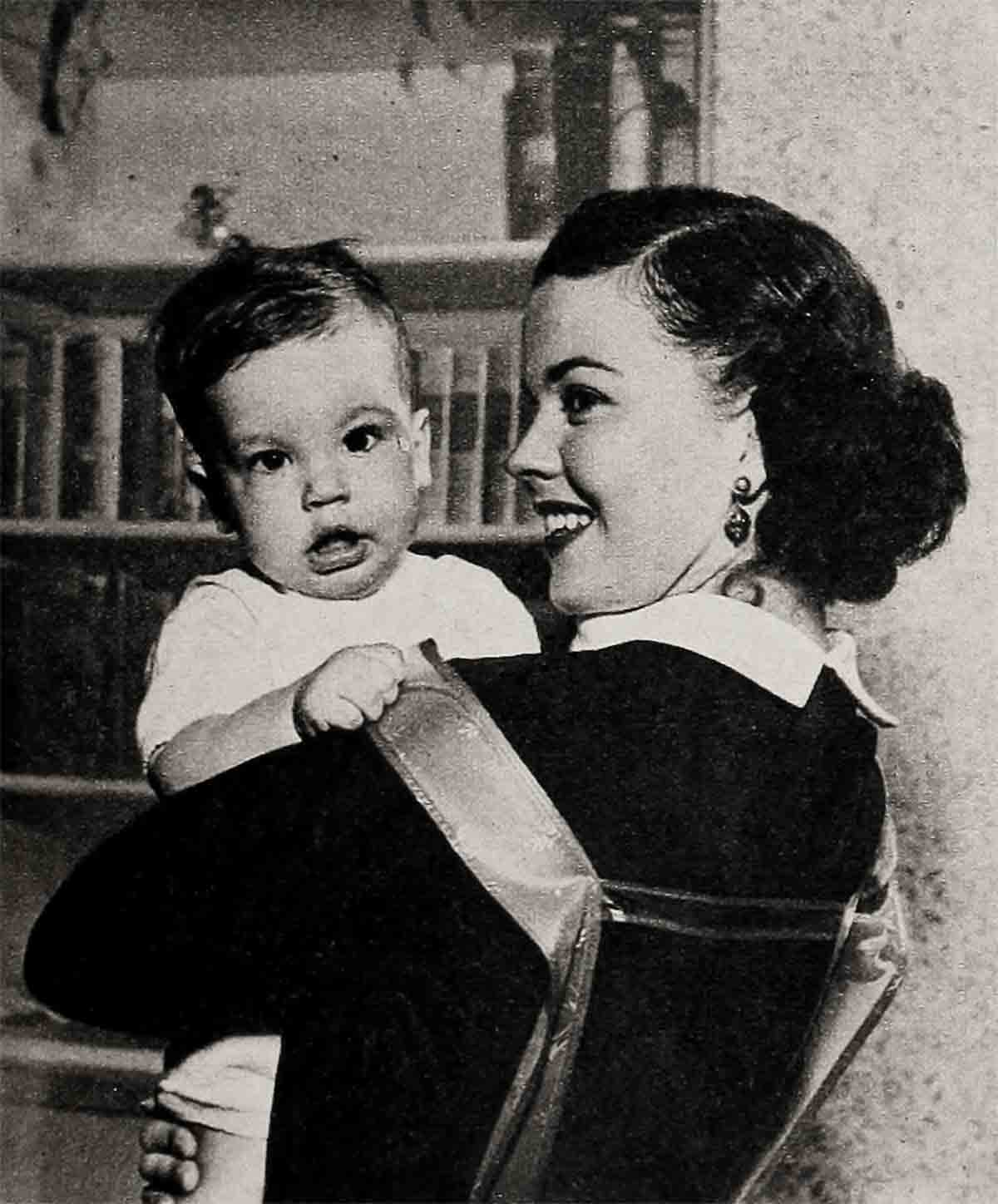
“Yes,” said Shirley with a sigh of resignation, as Susan sat down to the piano and began playing monkey music, but always with an ear cocked to our conversation. “After two years of absence I expected everything to be changed. Everybody looks the same. I’m no different, except my hair is black.”
“My hair is black, too,” said Susan, who obviously adores her mother and wants to be as much like her as possible.
“No, darling,” Shirley said. “Your hair is honey-colored. I think it’s very beautiful. It has gold in it.”
“It used to have sand in it,” said Susan.
“You’d better go outside again,” said Shirley. “You can swing on the trees if you don’t get your dress dirty.”
“I’ll get dirty,” said Susan.
“Then,” said Mommy, “why don’t you go out to the yard and see if the flowers are awake yet.”
That appealed to Susan’s curiosity; so she left us. I wanted to know how Shirley disciplined her children.
“The baby’s still too young to be affected by anything but a disapproving look,” she said. “When Susan has done something wrong, I put one hand under her chin, hold her hands with the other, and make her look straight into my eyes. The system has worked well, as I rarely have to spank Susan. Children, when they’ve been bad, just don’t want to look at their parents. It seems to increase their sense of guilt, and makes them less apt to break the rules the next time. Susan gets good marks at school; but everyone agrees she has a bossy quality. She wants to be the leader.” Suddenly Shirley stopped and said, “This must be fascinating to you—a mother talking about her children.”
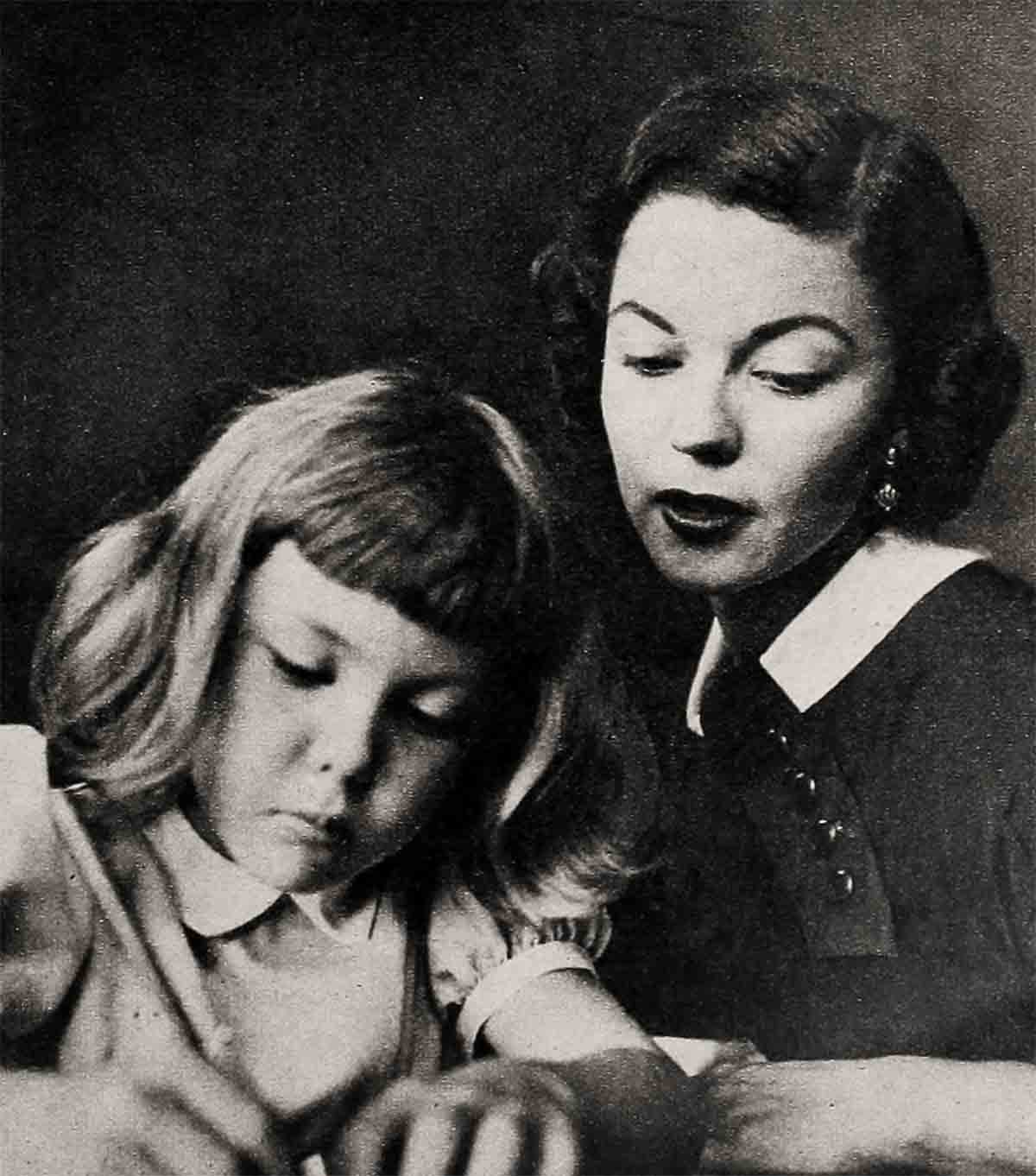
In the case of Shirley Temple it was.
When Susan came back in, she asked her mother for a pencil and piece of paper. “I’ll write you a letter so you can reverence it,” she explained to me. She sat down at a table and began to scrawl, holding up the completed work for her mother’s approval.
“Now, what is that,” said Shirley.
“Santa Claus,” replied Susan.
“Oh, Santa Claus again,” said Mommy. “The year round she writes him. In her class at school was av little Chinese boy. Susan had a crush on him because he painted so beautifully. So she asked Santa Claus for a little Chinese boy last Christmas.”
“And what did you do about that?”
“I got her a Chinese doll,” said Shirley.
“Now, what is this, Mommy?” asked Susan, again holding up her sketching paper.
“Oh, that’s easy,” said Shirley. “It’s the danger signs you see along the roads. You know, we came out here by station wagon, stayed at motels, and often cooked our meals on the roadsides. It seemed that every time I took over the driving, I’d get lost and land up in a lumber yard. There I would be sitting and looking like a simpleton. At such times, Susan would always ask, ‘Is this the way to California, Mommy?’ She’d make me furious.”
“We had clay in school. But we wasted it making turtles. I made all the turtles,” said Susan. “Do you want me to make a spider for you?”
“Susan,” said Shirley, “whose baby is this?”
“Why, he’s mine,” replied the little girl, as if almost surprised at the question, and resumed her sketching.
“That’s the way Charlie and I want her to feel,” explained Shirley. “From the beginning the baby has been her boy. Daddy and Mommy just take care of him for her. So she’s never been jealous of him or felt that he was an intruder. She’s a fine little nurse, too. Susan . . .”
“Yes, Mommy. I have now made a spider and a baby spider.”
“But it’s time for the baby’s bottle to be warmed. If I put him on the floor will you watch him? Don’t let him touch the flowers; and don’t tease.”
For a little while things went swimmingly. The baby became absorbed in one of his old shoes, while Susan examined an empty adhesive tape container. Then she suddenly started to do a somersault and bumped heads with the baby. Both began to cry.
In rushed Shirley. “What happened?” she said.
“We bumped heads,” said Susan. “I have a headache right in the middle of my forehead.”
“Oh, dear,” said Shirley, picking up the baby and brushing his tears away, “and just after I told Hedda what a fine nurse you were.”
The bell at the electrically operated gate rang and got stuck. Shirley put the baby in a play pen in order to go out and let in the photographers. Susan rushed to Barton. “Not too much sympathy now,” said Shirley.
“But he bumped his head,” said Susan.
“He’s all right,” said Shirley.
When the photographers began to set up their equipment, Shirley was feeding the baby vitamins with a dropper. “Fish oil,” she explained. Then she left the room for a comb and brush. Barton began playing with his shoes; and when Shirley returned, he was cooing to himself, oblivious to the commotion around him.
“Now, don’t you men play with the baby,” Susan warned the photographers. “He doesn’t very much like men.”
“He does, too,” said Mommy, eyeing the effects of the comb and brush on Barton’s new haircut. “He looks like an old tintype,” she observed.
“An old tim pipe,” echoed Susan.
“How’s Hymie?” Shirley asked the photographers.
“He’s fine,” one of them said.
“And his little girl?”
“She’s okay.”
Shirley was referring to Hymie Fink, the photographer, who had worked with her in her acting days. The questions i!lustrated a salient point in her personality. She never forgets old friends. So I had to laugh when a Washington columnist once wrote that “old friends from Hollywood” were disappointed in not being able to get in touch with Shirley Temple. Well, I wasn’t. I simply got in a cab and drove out to see her. Neither did John Ford (Susan’s godfather) have any difficulty in locating her. Nor a hairdresser by the name of Annabel. The range of her friends is exceedingly great.
But those days in Maryland were busy ones for Shirley. She did her own house work, took care of Susan, and came nearer to death than most people ever knew in having her second baby. Then there was ragweed. Three acres of it surrounded her home and had to be cut about every two weeks during the season. Shirley borrowed a tractor from a neighbor and cut the weeds herself.
The photographers were ready, and after several shots, Susan said, “How about me and Barton?”
Shirley smiled at her two children, and said, “Well, how about you two?”
“How about me and Barton and no Mommy?” Susan explained to the photographer.
“You have to have a mommy in the picture,” the photographer said, and Susan was satisfied.
“Don’t you miss the excitement of show business; or are you completely domesticated?” I asked Shirley.
“I’ve been domesticated for a long time,” she said. “Taking care of a family properly is much harder than having a movie career.”
The photographers wanted a shot of Shirley, Susan, and Barton walking together. (The baby, an adept crawler, still needs support when walking.) Before posing for the shot, Shirley went into the kitchen to get the baby’s bottle. “He’s getting hungry,” she explained to the photographers upon returning, “and if he sees this bottle, we’re dead.”
Then she described to Susan what they were all to do in the next shot, ending by singing “I’m Walking Behind You.” But when they started the walk, the little girl got a step ahead of mother and brother. “Now,” grinned Shirley, “you don’t have to take the camera angle in this one, Susan.”
The photographers moved to another part of the room, leaving a piece of electric cord on the floor. “Men,” called Susan, “please take the electricity with you. He” (indicating Barton) “likes electricity.”
Shirley gave the baby his bottle; and I asked what happened to her dogs.
“Very sad,” she said. “The Boxer and the Great Dane were great buddies. But in Maryland the Boxer got in a fight with a skunk, It was terrible. He smelled so bad that he couldn’t sleep in his own dog house without holding his head out the door to breathe. Finally, he walked in front of a truck and was killed. I think he deliberately committed suicide to get away from that odor. The Great Dane didn’t get over his pal’s death for a year. Before we left Maryland I had to sell him, not knowing whether we could find a place to keep him here.”
“You shouldn’t say that. It isn’t nice.” The voice was Susan’s; and it was directed at one of the photographers who had been teasing her.
“Well, all men aren’t nice,” said the photographer.
“Oh, yes, they are,” declared Susan.
“Remember that big word we used the other night,” said Shirley. “Tell him he’s that.”
“What, Mommy?”
“You know—in . . .”
“You are incorrigible,” said Susan triumphantly.
“And what does that mean?” I asked.
“It means,” said Susan, “that the man is hopeless.”
As the baby continued to drain the bottle, Shirley got into a discussion with the photographers about having her motion pictures—thirty-four altogether—cut down from 35 millimeters to 16 millimeters in size. She wanted to save them for her children. As the talk continued, Susan, who was holding Barton’s bottle, said, “If the men didn’t talk so much, the baby would eat better.” Shirley cast an amused grin in her daughter’s direction.
“What’s your secret for housekeeping?” I asked Shirley.
“No secret,” she said. “All you need is a little organization. We usually get up around six in the morning. Charlie’s an early riser—Navy training, I guess. And we go to bed around nine or ten at night. Most of our eastern friends went to bed quite early, worked, and had children; so I followed their pattern. You can get a lot done around the house, if you start at six in the morning.”
As the photographers packed their equipment, Shirley explained to them that two minute scars on her face had been caused by the chicken pox.
“I gave my Mommy the chicken pox,” said Susan proudly. She was back at her drawing again; and this time came up with a pelican “Well, goodbye, men,” she said to the departing photographers, “you won’t be seeing me again.”
Shirley suggested we go out to lunch and for a moment wondered if we should take Susan along. “No, I think we’d better not,” she said finally. “But I’ll have to have a private talk with her.” What she said to her daughter I did not ask; but Susan, without the slightest protest, skipped away into the kitchen for her lunch as Shirley called, “And, darling, don’t forget to take your nap on time.”
We lunched in a small open air patio connected with a nearby market, where one chose food cafeteria fashion; and there were no waiters. For her luncheon, the ex-film star had an enchilada, beans, a carrot salad, and milk. There was but little ogling of Shirley by the other patrons. I doubt if the men, especially the younger ones, knew who she was. Nobody asked her for her autograph. But the girls dealing out the food knew Mrs. Charles Black. They inquired about Susan.
“We see a lot of friends, and read a great deal” said Shirley. “Oh, I’ve got to tell you this one. We went to see Guys And Dolls in New York, and during intermission, Charles said, ‘Damon Runyon had a great flair for catching the personalities of New York people. You ought to get acquainted with his writing.” I asked, ‘Did you ever hear of a picture called Little Miss Marker?’ He said, ‘Yes. That was a picture you made as a baby, wasn’t it?’ I answered, ‘Yes. And do you know who wrote that story? Damon Runyon.’ ”
“How did you learn to drive that tractor?” I asked.
“It’s very simple—like driving an old car,” she said. “You can’t get much speed. If you hit a rock—very bad practice—you get off the tractor, pick up the sickle bar and free it of the stone. Then,” she mused, “you might dig up a wasp nest. I did. One of the wasps started buzzing my face. I headed full speed—about three miles an hour—for the garage. The wasp simply circled and dive-bombed me from the rear, stinging me right through my blue jeans.
“Charles. who was working in the garage, said, ‘For immediate relief for sting apply gasoline,’ and did so. The result was that I suffered from gasoline burn as well as the sting.
“Navy training?” I suggested.
“Maybe,” laughed Shirley. “Another wasp got me, but that was when I was painting the well.”
“Shirley,” I said, “you’re having too much fun just living to go back to the movie world. Have the producers really been putting the pressure on you to return to work?”
“I got a lot of television offers while I was in Maryland—we were close to New York, you know. And I’ve had two nice television series offered me here. Oh, don’t let me forget to buy some milk before we leave here.”
In the grocery store, she bought seven quarts of milk. As they were being placed in a sack, a man standing nearby said, “You must have some children.”
“Kittens,” said Shirley.
I helped carry the groceries into the kitchen, where Mrs. Temple was talking to Susan while she ate. She looked at me, shook her head, and said, “I knew it would be only a matter of time before that daughter of mine would be putting you to work.”
Walking to my car through the grounds over which the child star had romped, I began to reflect: Shirley Temple is gone. We now have Mrs. Shirley Temple Black. She might have been the most spoiled young lady in America. But instead she has worn her success with the dignity of a queen.
With equal poise she can talk to the President of the United States or a grocery clerk. Not only has she learned the true values in life, but has put them into application.
She may break into show business again; and if she does, she’ll break big. As a child, she was beautiful and talented. As a lady, she has humor, depth, understanding, and above all, much common sense. She has known the glitter of fame; the power of wealth; but she has learned that they are meaningless unless accompanied by happiness.
So, Mr. Producers, if you want to get Shirley back into show business, you’ll have to take these things into consideration. Your “irresistible script” will have to trump what Shirley already has: Contentment in the loving care of a mother for two adorable children, and tremendous respect and love for a fellow named Charles Black.
THE END
BY HEDDA HOPPER
It is a quote. MODERN SCREEN MAGAZINE OCTOBER 1953




